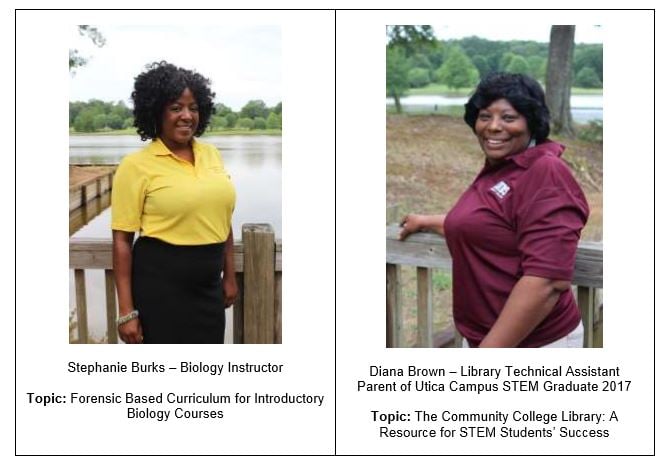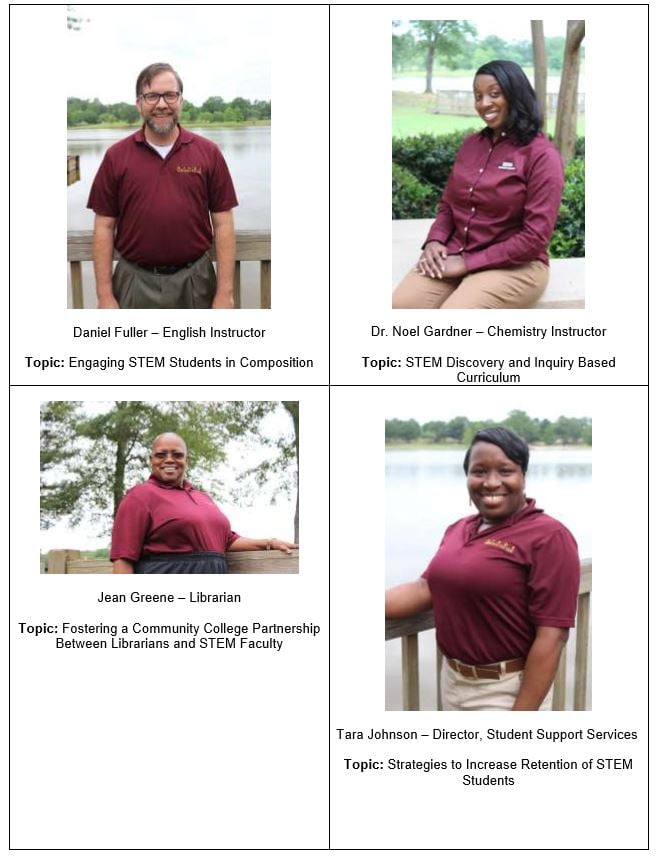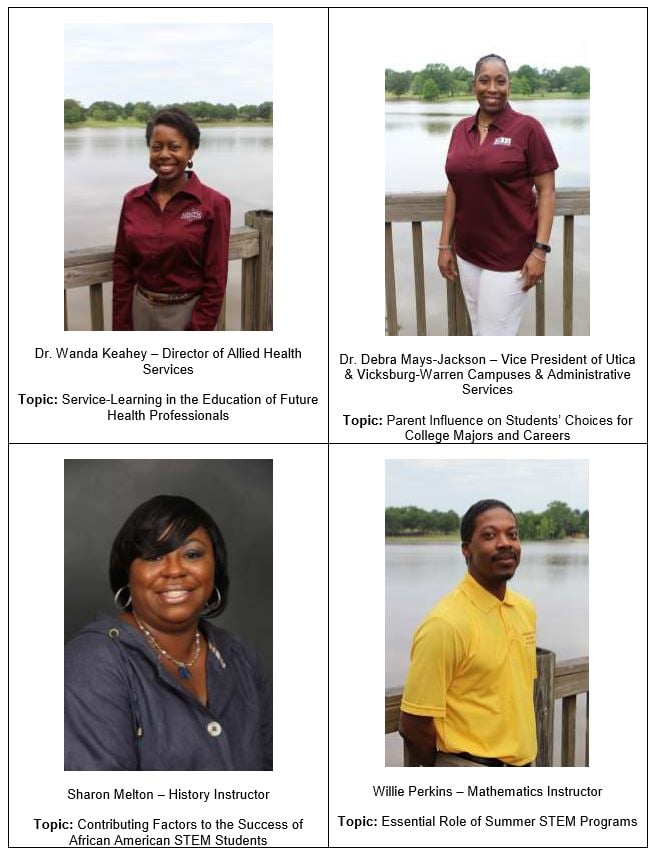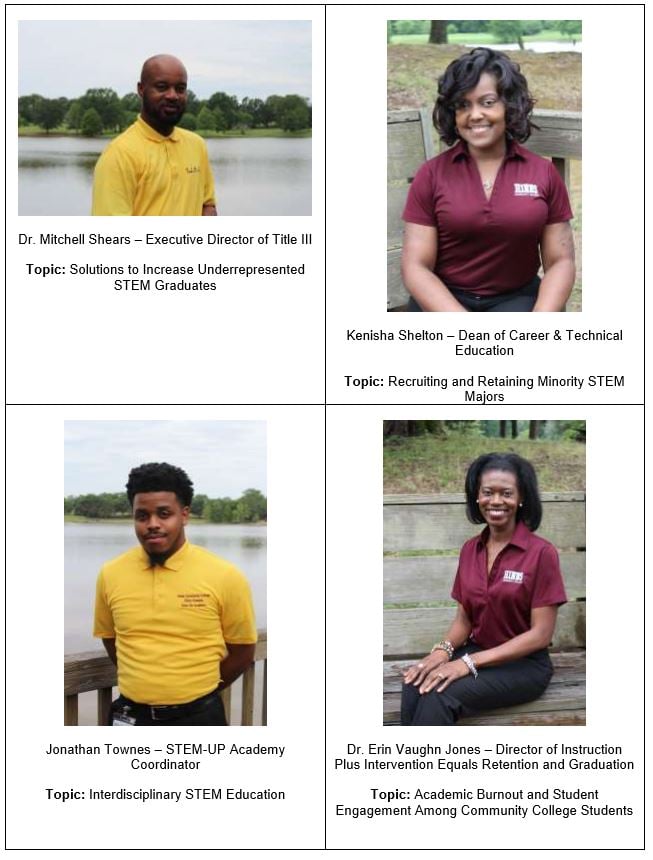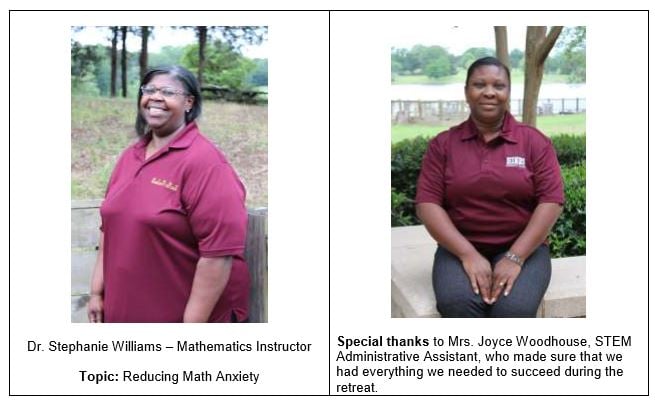As the executive director of Title III at Hinds Community College's Utica Campus, one of my responsibilities is to strengthen academic programs on the campus. One of the most effective ways to do so is to build the capacity of the faculty and staff. In order to build the capacity of the faculty and staff one has to be creative and innovative as well as be able to find funders to pay for such projects.
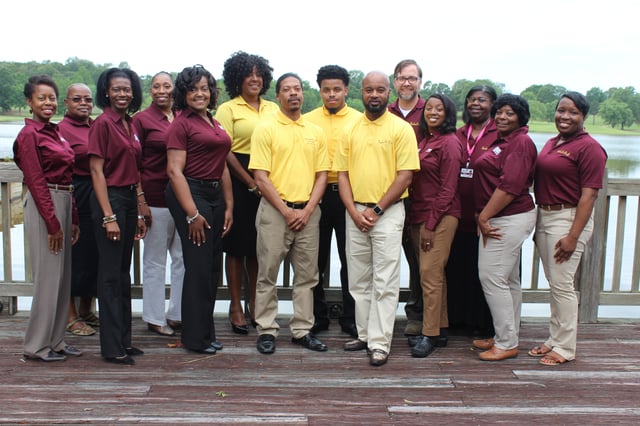
Front Row (L-R) Dr. Wanda Keahey, Dr. Erin Vaughn Jones, Kenisha Shelton, Willie Perkins, Dr. Mitchell Shears, Dr. Noel Gardner, Diana Brown, and Tara Johnson Second Row (L-R) Jean Greene, Dr. Debra Mays-Jackson, Stephanie Burks, Jonathan Townes, Dan Fuller and Dr. Stephanie Williams Not Pictured – Sharon Melton
Working in a community college, it is very challenging to provide opportunities to build the capacity of faculty because community college faculty spend the majority of their time teaching and working with students. According to Price (2011), “Two-year colleges aren't known for their scientific research programs. Faculty members at such institutions are usually too busy teaching. They often teach more courses in a single year than faculty members at research universities teach before standing for tenure. There are no postdocs or graduate students to do the laboratory work -- just freshmen and sophomores, many with educational deficits.”
Community college faculty spend 15 hours or more a week teaching, compared with 10 to 14 hours a week for the majority of their colleagues at baccalaureate and master's institutions and fewer than four hours a week for the majority of faculty at research universities. During those 15 class hours, 67 percent of community college faculty teach from 75 to more than 150 students. Community college faculty register more student contact hours than any other educational sector. (Rifkin, n.d.)
Other than being busy teaching, community college faculty have other challenges that get in the way of community college faculty members developing and submitting scholarly writing publications, which includes submitting grant proposals to the National Science Foundation. A report from a conference sponsored by the National Science Foundation at the American Association of Community College in 2011 included the following challenges:
- Shortage of faculty time and lack of incentives for faculty to develop proposals and manage grant projects.
- Little institutional capacity for applying for and managing federal awards.
- Inconsistent college administration support for grants.
- Insufficient grant-writing expertise.
- Insufficient internal and external partnerships necessary for successful applications.
- Misunderstanding of the grant review and award process.
- Limited resources for faculty and staff to learn how to submit proposals and manage federal awards.
The Utica Campus has overcome some challenges with submitting grant proposals to the National Science Foundation. Since 2009, the Utica Campus alone has received funding support for six projects:
- The Utica Campus Community College Transformation HBCU-UP Initiative
- Implementation Project: Utica Campus Community College Transformation HBCU-UP Initiative
- Planning Project to Establish a Cohesive Community College STEM Institutional Transformation Academy - STEM-UP Academy
- Targeted Infusion Project: Addressing the "M" in STEM - Utica Campus Community College (UC3) Improving Interventions and Instruction (I3) through STEM
- Implementation Project: Hinds Community College- Utica Campus Phase II- Establishing a Cohesive Community College STEM Institutional Transformation Academy - STEM-UP Academy
- Rural Girls Engaged in Math and Science Plus Technology.
Although we have been successful in the area of grant writing, we have not published our results through peer-reviewed research journals. The National Science Foundation expects that investigators should disseminate and share results with other researchers. Therefore, as part of the Planning Project to Establish a Cohesive Community College STEM Institutional Transformation Academy – STEM-UP Academy, I was able to secure supplemental funding for the Utica Campus to strengthen the research capacity of faculty and staff interested in STEM research. With these funds, I created the Institute for STEM Academic Research. The overall goal was to create an environment that is conducive to promoting research and scholarly writing activities. The objectives of the institute are:
- Objective 1: Recruit and train up to 10 STEM faculty and administrators interested in scholarly writing, such as publishing journal articles, research proposals and/or writing competitive grant proposals.
- Objective 2: Provide intentional authentic research writing support activities, including assigning a writing coach/mentor to ensure scholarly writing success.
- Objective 3: Provide opportunities for faculty to present findings within and outside HCCUC.
Through the institute, 15 administrators, faculty and staff members on the Utica Campus participated in a three-day writing retreat at Eagle Ridge Conference Center. The retreat was very intense. It started with pre-assignments and videos that all participants had to review and complete before attending the retreat.
All participants were guided through the process of writing literature reviews. The participants were guided by Dr. Ingrad Smith (pictured below), CEO of Educational Research Services. Educational Research Services sponsored Institutes for Academic Research which is designed to publish research for grants, publish research articles for higher education professors and publish research papers in journals designed for K-12.
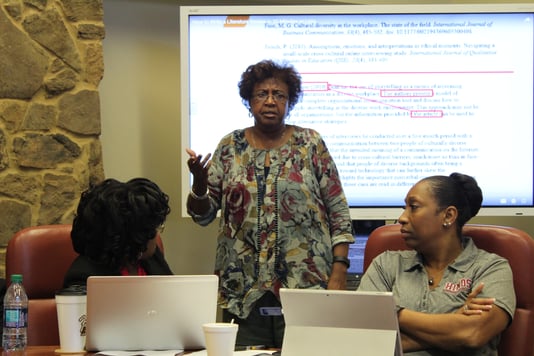 At the institute, participants were assigned a writing coach/mentor to ensure each participants’ success. Three coaches and mentors were on hand to support participants through the research and writing process. Coaches/mentors available included Dr. Michelle Richards, CEO of Prescriptive Educational Planning, LLC; Dr. Barbara Howard, Professor at Jackson State University; and Dr. Antwon Woods, Professor at Belhaven University.
At the institute, participants were assigned a writing coach/mentor to ensure each participants’ success. Three coaches and mentors were on hand to support participants through the research and writing process. Coaches/mentors available included Dr. Michelle Richards, CEO of Prescriptive Educational Planning, LLC; Dr. Barbara Howard, Professor at Jackson State University; and Dr. Antwon Woods, Professor at Belhaven University.
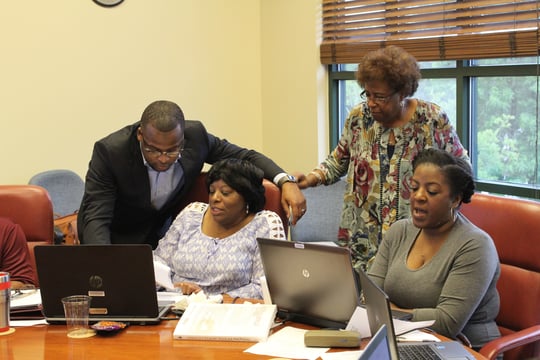
Dr. Antwon Woods, Writing Coach & Mentor, assists Diana Brown while Dr. Ingrad Smith listens. Also pictured is Stephanie Burks.
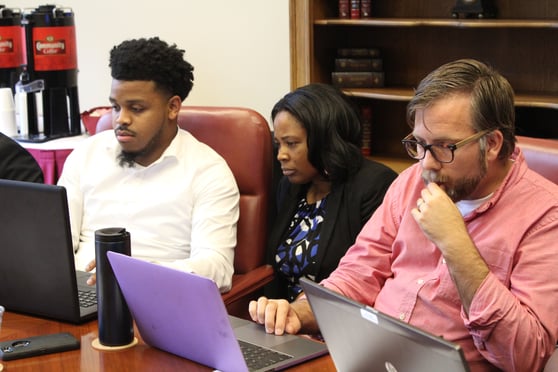 Dr. Barbara Howards takes a moment to read some of Jonathan Townes' writing, while Dan Fuller edits his literature review
Dr. Barbara Howards takes a moment to read some of Jonathan Townes' writing, while Dan Fuller edits his literature review
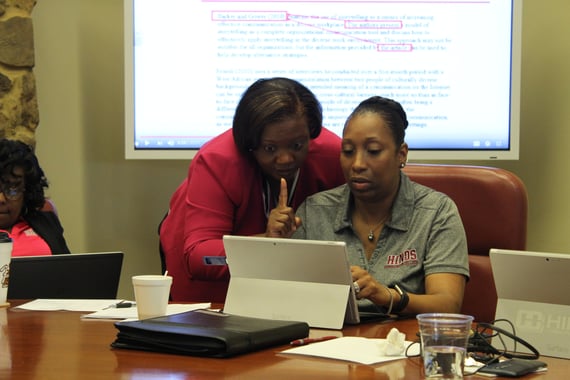 Dr. Debra Mays-Jackson is being coached by Dr. Michelle Richards. Although the retreat was intensive, participants found time to laugh and learn about each other.
Dr. Debra Mays-Jackson is being coached by Dr. Michelle Richards. Although the retreat was intensive, participants found time to laugh and learn about each other.
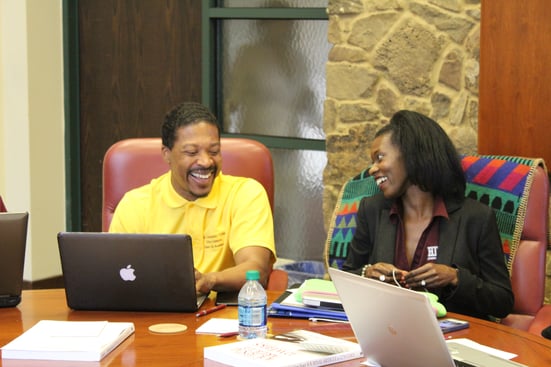
“The experience was very worthwhile. I have been with Hinds less than a year and this opportunity gave me time to learn more about my colleagues. There was time to do more than write, but to laugh and get to know one another personally and professionally.”
– Dr. Erin Vaughn Jones
(l-r) Willie Perkins and Dr. Erin Vaughn Jones
Now that the three day retreat has ended, participants are engaged in weekly conference calls with Dr. Ingrad Smith. Each week, there is a focus to discuss and participants are challenged to refine their literature review to prepare for submission for publication and to present at conferences.
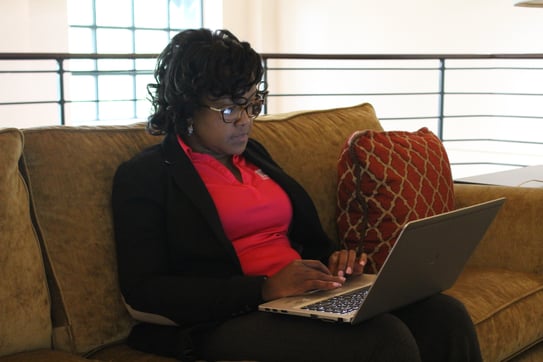
“It was a great learning opportunity as well as a great professional environment for us to connect and develop our writing skills with help from our mentor and support from our peers!” – Kenisha Shelton
There are two more stages to this project. In July, selected administrators, faculty and staff will travel to Sugar Land, Texas, to participate in a writing retreat focused on National Science Foundation grant writing and a Scholarly Writing Symposium will be held in early fall for each presenter to present their findings.
Overall, the institute has been an awesome experience for the participants. While our work is still in progress, we look forward to sharing our final products with the Hinds family and other researchers. Special thanks to Dr. Claudia Rankins, Program Officer for the HBCU-UP Program at the National Science Foundation, for providing the funds for this awesome opportunity.
Here is a glimpse of each participant and their topics.
